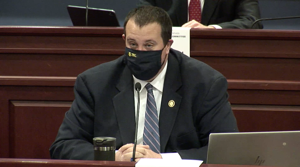Republicans kick off series of election administration hearings in Pennsylvania

(The Center Square) – Republicans in the state House grilled election officials for nearly three hours on Thursday about guidance issued ahead of the 2020 election in the first of 14 scheduled meetings to discuss the shortcomings of Pennsylvania’s voting laws.
State Government Committee Majority Chairman Seth Grove, R-York, insisted the meetings serve to educate the public about election administration and will not relitigate issues from 2020, despite a widespread insistence from the majority party that inconsistencies in the application of state laws resulted in different ballot counting rules in some of Pennsylvania’s 67 counties.
“We’ve all moved on,” Grove said. “Everybody that I talked to has suggested and recommended changes to be made. I think we all agree that changes need to be made. This is not about 2020. It’s not about 2019 or 2018. It’s about moving forward.”
Minority Chairwoman Margo Davidson, D-Upper Darby, summed up her party’s frustration with the entire probe, insisting that Republicans refuse to accept that President Joe Biden’s victory is legitimate. And after three hours, she said, Secretary of State Kathy Boockvar’s answers only further prove “that we had a free, fair, accurate and uniform election.”
“There will be some voters that will never be satisfied with the results of this election,” she said. “Thirteen hearings is not going to change that. Whatever we do here is not going to change that.”
Boockvar, herself, said the Legislature should change some of the laws that led to counting discrepancies. In other instances, she said more time and more uniform poll worker training may have alleviated some of the confusion county election officials experienced in November.
Gov. Tom Wolf signed Act 77 in October 2019. The bipartisan measure expanded mail-in voting to most residents with no excuse necessary, among other changes, that meant poll workers had a lot to learn before both the June 2 primary and the Nov. 3 general election. By the time polls closed in November, a record-breaking 6.9 million ballots were cast, including 2.5 million received through the mail that had to be processed by hand.
“It was a lot for counties to do all at once,” Boockvar said. “But despite the crunch, the counties really brought about the most successful, widely participatory election that we’ve seen in the history of the commonwealth.”
Still, Boockvar said, different counties applied some of the guidance regarding curing defective ballots and naked ballots differently – an issue that the General Assembly could correct through legislation.
In June, for example, the Department of State told counties to count “naked” ballots – those that were submitted without the secrecy envelope. The state Supreme Court later ruled that doing so violated Act 77, but not all counties got the message.
Boockvar also told counties it was OK to contact voters with defective ballots to come “cure” them at the polls with a provisional ballot instead. It was guidance that not every county followed.
“This goes to the local authority of the counties to make these judgment calls,” Boockvar said. “I would love to have the authority to tell all counties to give voters a chance to fix errors. … We can’t mandate it.”
She said updating the law to give the department that authority “is a great way to make sure no voter is disenfranchised.”
“I would include any ability to count naked ballots, too,” she said. “These are qualified voters that just made a mistake. If they are a qualified voter, their vote should count.”
Disclaimer: This content is distributed by The Center Square

